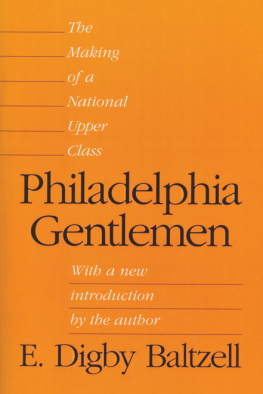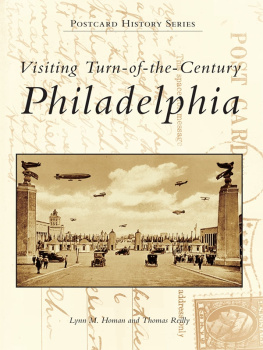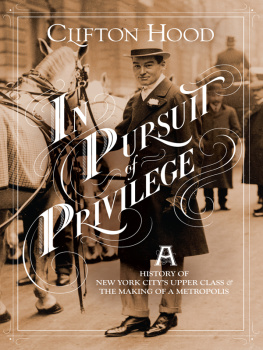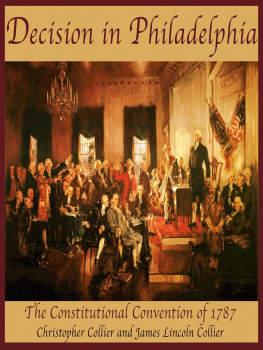Philadelphia
Gentlemen
Philadelphia
Gentlemen
The Making of a
National Upper Class
E. Digby Baltzell
With a new introduction
by the author

Transaction Publishers
New Brunswick (U.S.A.) and London (U.K.)
Transaction Large Print Edition 2015.
New material this edition copyright 1989 by Transaction Publishers, New Brunswick, New Jersey. Originally published in 1958 by the Free Press.
Copyright 1971, 1979 by E. Digby Baltzell.
All rights reserved under International and Pan-American Copyright Conventions. No part of this book may be reproduced or transmitted in any form or by any means, electronic or mechanical, including photocopy, recording, or any information storage and retrieval system, without prior permission in writing from the publisher. All inquiries should be addressed to Transaction Publishers, 10 Corporate Place South, Piscataway, New Jersey 08854. www.transactionpub.com
This book is printed on acid-free paper that meets the American National Standard for Permanence of Paper for Printed Library Materials.
Library of Congress Catalog Number: 89-4362
ISBN: 978-0-88738-789-0 (paper) ; 978-1-4128-5510-5 (large print)
Printed in the United States of America
Library of Congress Cataloging-in-Publication Data
Baltzell, E. Digby (Edward Digby), 1915-1996
Philadelphia gentlemen : the making of a national upper class / E. Digby Baltzell; with a new introduction by the author.
p. cm.
Reprint. Originally published: Philadelphia : University of PennsylvaniaPress, 1979.
Includes bibliographical references and index.
ISBN 0-88738-789-6
1. Philadelphia (Pa.)Civilization. 2. Upper classesPennsylvaniaPhiladelphiaHistory. 3. Elite (Social sciences) PennsylvaniaPhiladelphiaHistory. I. Title.
F158.3.B3 1989
305.520974811dc19
89-4362
CIP
Contents
List of Tables
and Social Register and Non-Social Register Affiliation
Philadelphia Gentlemen, begun as a Ph.D. dissertation at Columbia University in 1946, was published as a book in 1958. It covered the Protestant era in the history of American leadership that was coming to an end in 1940, on the eve of the Second World War. The second paperback edition, published in 1971, included an Afterword that showed how the American upper class as a whole had changed since 1940. The changes outlined in that Afterword, which has been retained here, are as salient today as they were then, perhaps even more so. In this new Preface, I show how Philadelphia Gentlemen marked the beginning of a theoretical orientation toward class authority and leadership in America that has informed my work ever since; and secondly, I point out some important changes in Philadelphias leadership structure in the almost half-century since 1940.
The Bomb was dropped on Hiroshima in August 1945. As I had enough points to get out of the navy almost immediately, I was able to enroll in the Ph.D. program in sociology at Columbia University in September. In that academic year, I read Max Weber and Alexis de Tocqueville for the first time. In December I bought Tocquevilles Democracy in America in a handsomely boxed, two-volume set that had just been published by Alfred A. Knopf. No book has ever influenced me more than the second volume of this classic. Although Marx was endlessly quoted and referred to, Tocquevilles name was never mentioned in class during my two years of graduate study, except once by a visiting lecturer from the New School for Social Research who noted in the course of his lecture that Tocquevilles Ancient Regime was one of the finest books ever written in political science and sociology. This was before the paperback revolution, but after more than a years search, I found a copy at Blackwells bookstore in Oxford; I shall return to the Ancient Regime in a moment. In the meantime, in the early summer of 1946, I bought and read a just published copy of From Max Weber: Essays in Sociology, Translated, Edited and with an Introduction by H. H. Gerth and C. Wright Mills.
The great value of the writings of Tocqueville and Weber is that they abound with what Robert K. Merton has called theoretical insights of the middle range. And it is just such theoretical insights that stimulate and guide us in asking pertinent questions, and ordering relevant facts, about any social structure. At any rate, it was Webers famous essay, Class, Status, Party, in the Gerth and Mills collection, that first stimulated me to ask questions about class, status, and authority, which I have continued to do (in the style, I like to think, of Czannes endless paintings of his beloved mountain outside Aix, in Provence) for more than four decades since that summer of 1946 when I began to write a dissertation that eventually became Philadelphia Gentlemen.
Stratification theory, as developed in Webers famous essay, involved two logically distinct aspects, a hierarchy of class situations on the one hand and a hierarchy of status situations on the other. Classes are not communities but consist of individuals with similar life chances or economic positions in the market. In time, and especially over the generations, hierarchies of classes tend to produce communities of families that often stand in sharp opposition to pretensions of sheer property or the market. The key to Webers understanding of status groups is to be found in the following paragraphs:
In contrast to classes, status groups are normally communities. They are determined by specific, positive or negative, social estimations of honor . Status honor need not necessarily be linked with class situation. On the contrary, it normally stands in sharp opposition to the pretensions of sheer property.
Both propertied and propertyless people can belong to the same status group, and frequently do with very tangible consequences . The equality of status among American gentlemen, for instance, is expressed by the fact that outside the subordination determined by different functions of business, it would be considered strictly repugnantif even the richest chief, while playing billiards or cards in his club in the evening, would not treat his clerk as in every sense fully his equal in birthright. It would be repugnant if the American chief would bestow upon his clerk the condescending benevolence marking a distinction of position which the German chief can never dissever from his attitude.
I had been born and raised among a privileged class of families in Philadelphia that almost exactly epitomized Webers description of a status group just quoted. My friends, in the schoolroom, on the playing fields, at dancing classes and summer resorts were the sons and daughters of both very wealthy and powerful, as well as less wealthy and powerless, bankers, businessmen, lawyers, and physicians. Within the class or status group, however, there existed a very real democratic spirit where all were treated on their individual merits. In my circle of sports-loving friends at least, it was considered effeminate to mention such things as the social position or lineage of ones friends or acquaintances; as a matter of fact, I learned the economic history of many of my friends extended families for the first time while researching and writing Philadelphia Gentlemen. It was no wonder, then, that I was frankly shocked at the invidious comparisons and snobberies, articulated as social science, which I found in the Columbia classrooms as well as in such studies as the Lynds two Middletown books or Lloyd Warners Yankee City Series both of which I read during that first year in Fayerweather Hall, at Columbia. Perhaps there is some truth in the waggish view that snobs and racists are merely amateurs (without Ph.D.S) who speak like professional sociologists.
Next page






